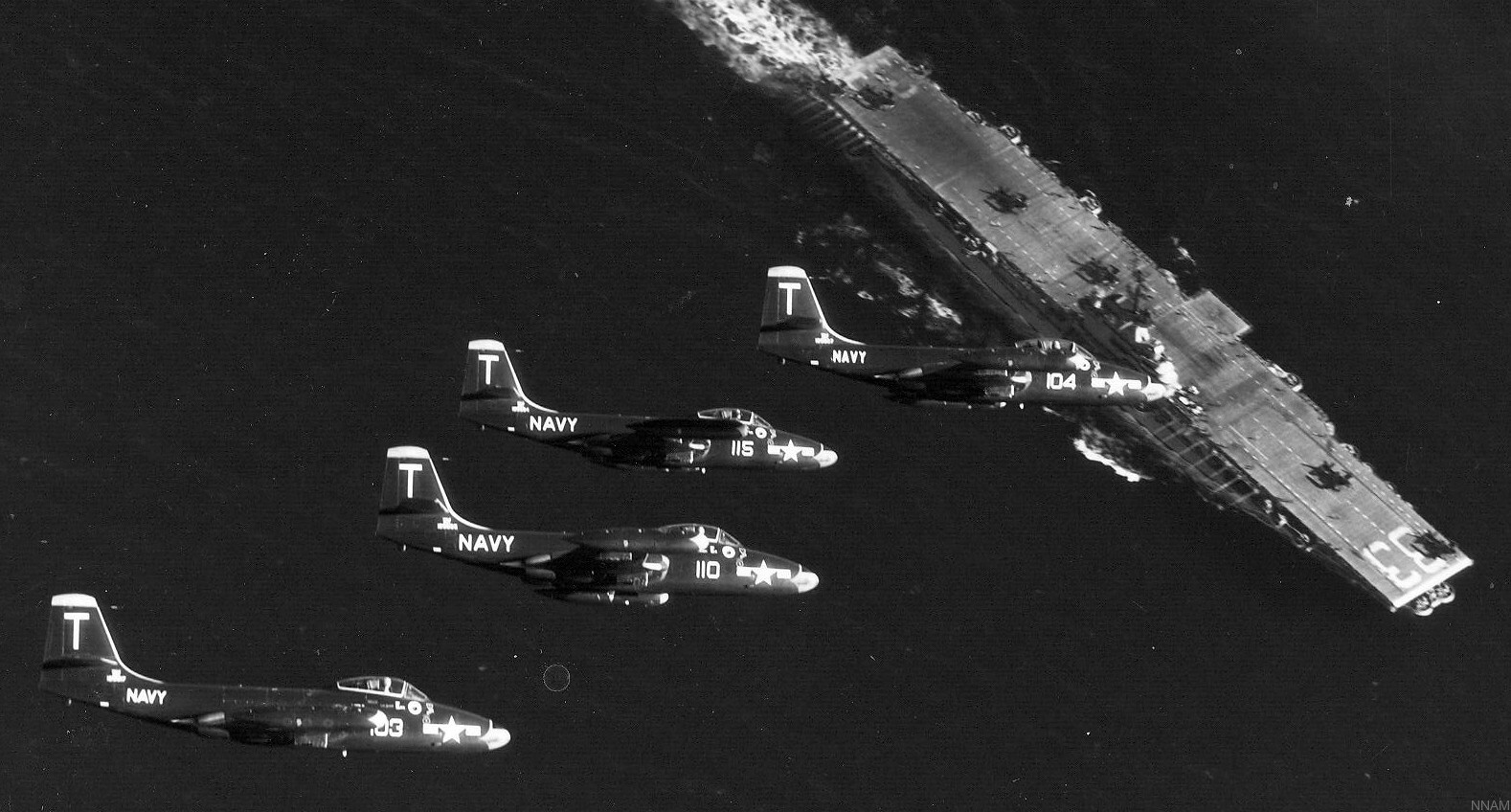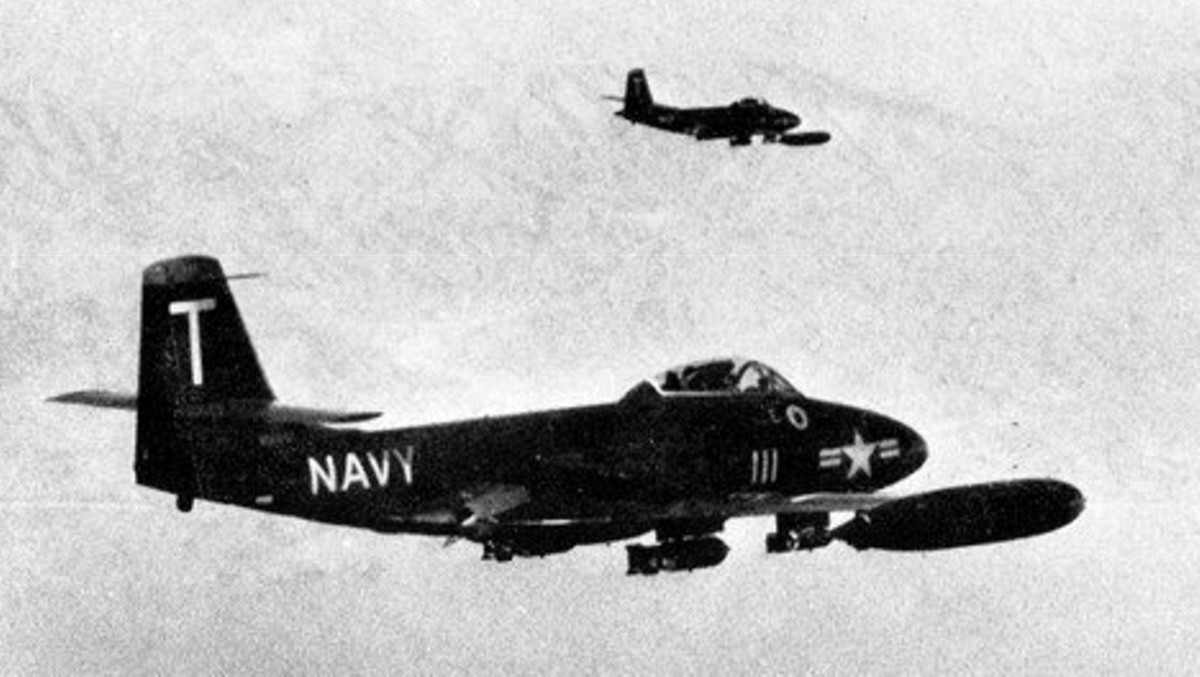 |
||||||
|
HOME
|
US Navy -
ships
|
US Navy - air
units
|
USMC - air
units
|
International
Navies
|
Weapon Systems
|
Special Reports |
||||||
|
US Navy - Fighter Squadron 11
(FITRON 11) VF-11 'Red Rippers' (1948-1959) |
||||||
|
||||||
| 12/20 | ||||||
|
||||||
| images | ||||||
 McDonnell F2H-4 Banshee (VF-11 / ATG-201) embarked on USS Essex (CVA 9) - 1958  Pilots of VF-11 Red Rippers in front of an F2H-4 Banshee aboard USS Essex (CVA 9) - 1958  McDonnell F2H-4 Banshee (VF-11 / CVG-10) embarked on USS Coral Sea (CVA 43) - circa 1956 The aircraft had obviously landed aboard USS Randolph (CVA-15), which was deployed to the Mediterranean Sea from July 1956 to February 1957. It was common to "paint" visiting aircraft.  McDonnell F2H-4 Banshee (VF-11 / CVG-10) embarked on USS Coral Sea (CVA 43) - circa 1956  McDonnell F2H-4 Banshee (VF-11 / CVG-10) embarked on USS Coral Sea (CVA 43) - circa 1956  McDonnell F2H-4 Banshee (VF-11 / CVG-10), being refueled by a North American AJ-2 Savage of VC-8 - circa 1955  McDonnell F2H-2 Banshee (VF-11 / CVG-101) embarked on USS Kearsarge (CV 33) drops bombs over Korea - 1953  McDonnell F2H-2 Banshee (VF-11 / CVG-101) embarked on USS Kearsarge (CV 33) over North Korea - 1953  McDonnell F2H-2 Banshee (VF-11 / CVG-101) embarked on USS Kearsarge (CV 33) - October 1952  McDonnell F2H-2 Banshee (VF-11 / CVG-101) embarked on USS Kearsarge (CV 33) over Wonsan, Korea - October 1952  colour variant  bomb-loaded McDonnell F2H-2 Banshee (VF-11 / CVG-101) embarked on USS Kearsarge (CV 33) over Korea - 1952-53 |
||||||
|
The Red Rippers were commissioned in 1927 as VF-5S in the earliest
days of Naval Aviation and are proud to be the Navy’s oldest
continuously active fighter squadron. The Rippers began their
distinguished heritage in Hampton Roads, Virginia flying the Curtis
F6C-3 HAWK. They served in both theaters of World War II, the Korean
War, the Vietnam War, and in Operations PROVIDE COMFORT, SOUTHERN
WATCH, OPERATION ENDURING FREEDOM, and OPERATION IRAQI FREEDOM. From
the decks of the USS LANGLEY (CV-1), America's first carrier, to the
USS HARRY S. TRUMAN (CVN-75), the Red Rippers have been indelibly
written into the history of Naval Aviation. Prior to WWII, the Rippers flew a number of propeller aircraft including the Boeing F3B-1 and F4B-1, and the Grumman FF-1 and F3F-1, and held the following squadron designations: VF-5S, VB-1B, VF-5, and VF-4. During WWII, the Rippers (then known as VF-41) supported the allied invasion of North Africa, downing sixteen enemy aircraft in the Grumman F4F-3 WILDCAT. They also conducted the first air strikes against German forces in Norway in September 1943. The Red Rippers (re-designated VF-A) transferred to the Pacific theater in 1944, operating from USS BUNKER HILL and USS ESSEX. The squadron additionally flew the first air strikes against Tokyo in the Grumman F6F HELLCAT. In 1948, the Rippers became Fighter Squadron ELEVEN (VF-11), and leapt into the jet age flying the McDonnell F2-1 BANSHEE. They flew the BANSHEE during the Korean War from USS KEARSARGE. The second Red Rippers: (from wikipedia) VF-5 was established on 1 February 1927 at Hampton Roads, Virginia flying the Curtis F6C-3 Hawk. From 1927 to World War II, the squadron flew various aircraft including the Boeing F3B-1 and F4B-1, the Grumman FF-1 and F3F-1 and also held the following designations (designations tended to change based on the mission; e.g., "S" for scout, "B" for bomber): VF-5S, VF-5B, VB-1B, and VF-4. During World War II, VF-41 deployed on USS Ranger supported the Allied invasion of Northwest Africa, downing 14 Vichy French aircraft in the Grumman F4F-3 Wildcat on 8/9 November 1942. The squadron lost 7 F4Fs in action over the same period. In October and November 1943 while operating from USS Ranger, VF-41 attacked targets in German-occupied Norway. The squadron transferred to the Pacific Theatre. VF-4 deployed aboard USS Bunker Hill losing 5 F6Fs in operations off the Philippines in November 1944. VF-4 deployed aboard USS Essex and participated in the Battle of Mindoro, attacks on Japanese bases on Formosa and the Battle of Okinawa, losing 28 F6Fs between November 1944 and March 1945. For the fighter-bomber mission the Hellcat was fitted with wingroot pylons, each of which could carry a 1,000 -Ib bomb or a 'Tiny Tim' rocket. Smaller rockets were carried on three zero-length launchers on each wing. VF-11 operating the F8F-1 Bearcat was assigned to Carrier Air Group One (CVG-1) embarked on USS Tarawa on a cruise from the U.S. West Coast to the U.S. East Coast from 1 October 1948 to 21 February 1949. VF-11 flew the F2H-2 Banshee during the Korean War as part of Carrier Air Group 101 (CVG-101) deployed on USS Kearsarge from 11 August 1952 to 17 March 1953. During this deployment VF-11 lost 2 F2H-2s and their pilots to enemy fire. VF-11 was assigned to Carrier Air Group 10 (CVG-10) aboard USS Coral Sea for a Mediterranean from 13 August 1956 to 11 February 1957. VF-11 operating the F2H-4 was assigned to Air Task Group 201 (ATG-201) aboard USS Essex for a deployment to the Mediterranean, the Indian Ocean and the Western Pacific from 2 February to 17 November 1958. In the Mediterranean, USS Essex supported the US Marines landed in Lebanon. In 1959, VF-11 moved to NAS Jacksonville and was disestablished on 15 February 1959, their men and equipment being distributed to other squadrons and activities. The 3rd VF-11, redesignated from VF-43 on 16 February 1959 adopted the insignia and nickname of the disestablished second VF-11. |
||||||
| patches + more | ||||||
 |
||||||
|
|
seaforces.org
|
US Navy
Air Units start page
| |
